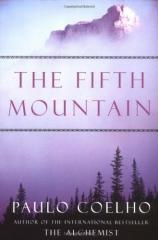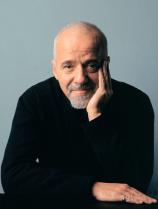Reading Group Guide
Discussion Questions
The Fifth Mountain

1. The Fifth Mountain and The Alchemist share the theme of a quest, a journey that takes the main character far from his own country. In what ways does Santiago's search in The Alchemist differ from Elijah's in The Fifth Mountain? In what ways are the two quests similar?
2. Angels play an important part in The Fifth Mountain, whether the angel of God or Elijah's personal guardian angel. Today, many people profess to believe in the existence of angels. What forces may contribute to the resurgence of belief in angels in the last years of the 20th century?
3. A major theme of The Fifth Mountain is the crucial role of the development of the alphabet as a conveyor of information easily disseminated. Why was the "invention of Byblos" such an essential element of civilization? How did the Greek and Roman alphabets, unlike previous forms of writing such as hieroglyphics and cuneiform, make literacy accessible to all?
4. "Sometimes," Elijah says, "it [is] necessary to struggle with God." Is this how most believers -- Christian, Jewish, and Muslim -- feel? What Scriptural authority can be cited to sustain such a position? What arguments support the opposing view--that one should always submit to the "will of God"?
5. Everything has its reason for being, the angel tells Elijah. He need only distinguish the temporary from the lasting: the unavoidable is temporary; the lessons of the unavoidable are lasting. To what extent does this apply to everyday life? Has the complexity of late 20th century existence rendered this advice obsolete? Or has the essential truth of this observation remained valid for thousands of years?
6. "All life's battle teach us something, even those we lose," Elijah tells the young boy. In what way is this demonstrated in The Fifth Mountain? Which battles does he lose and which does he win? Is the most significant battle in the novel a literal or a spiritual one?
7. Elijah is sometimes torn between the desire to serve God and the needs of those he has come to love. He attempts to return to Israel, only to find his way blocked by an angel with a flaming sword. Is it unusual to find the dictates of God in conflict with worthy human goals? Would most people today, faced with such contradictory demands, experience the conflicts that Elijah suffered?
8. In the rebuilding of Akbar, Elijah enlists the aid of women, the old, the very young--those who could not flee the destroyed city. In so doing, he discovers a resource that had never been utilized. What does he mean when he says, "Today we know that the old, the widows, the orphans also departed. They left in their place a band of youths of every age..."?
9. Many cultures, both ancient and contemporary, have believed that knowing the true name of a person or thing gives one mastery over it. What is the significance of Elijah's telling the survivors of Akbar to choose new names for themselves? In the end, does he live up to his own chosen name--Liberation?
The Fifth Mountain
- Publication Date: February 17, 1999
- Paperback: 245 pages
- Publisher: Harper Perennial
- ISBN-10: 0060930136
- ISBN-13: 9780060930134








